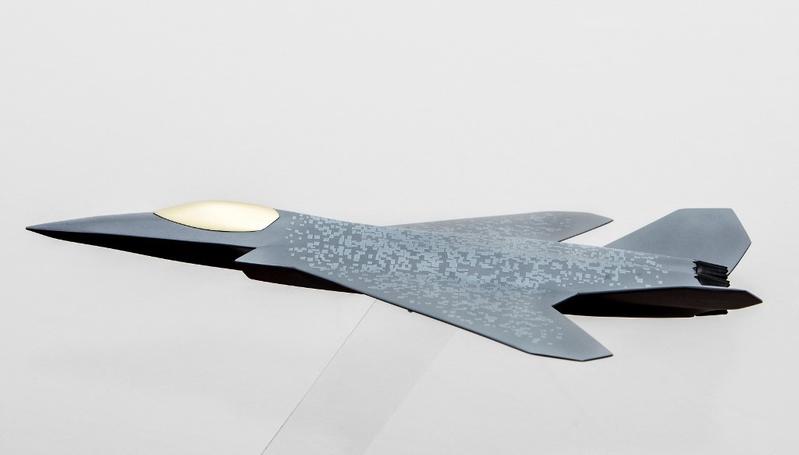 This handout picture released on Feb 19, 2020, by the French Ministry of the Armed Forces (Ministere des Armees), shows a model of the French-German project to create a European new generation fighter-jet (New Generation Fighter). The aircraft, due to be operational around 2040, is the centrepiece of the Future Combat Air System (FCAS) programme, which also includes drones and future cruise missiles. (VERONIQUE BESNARD / MINISTERE DES ARMEES / AFP)
This handout picture released on Feb 19, 2020, by the French Ministry of the Armed Forces (Ministere des Armees), shows a model of the French-German project to create a European new generation fighter-jet (New Generation Fighter). The aircraft, due to be operational around 2040, is the centrepiece of the Future Combat Air System (FCAS) programme, which also includes drones and future cruise missiles. (VERONIQUE BESNARD / MINISTERE DES ARMEES / AFP)
BERLIN - Germany and France have launched a new effort to resolve an impasse over the development of a joint fighter jet, Europe’s biggest defense project that has sparked tensions between Berlin and Paris, security and industry sources said on Wednesday.
Costing more than 100 billion euros (US$120.4 billion), the Future Combat Air System (FCAS) brings together Germany, France and Spain to forge an array of weapons amid deepening European defense cooperation.
Dassault Aviation, Airbus and Indra are involved in the scheme to start replacing France’s Rafale and German and Spanish Eurofighters from 2040.
France, represented by Dassault, is seen as particularly sensitive about access to its nuclear-capable supply chain. Germany, whose interests are represented in the project by Airbus, wants an equitable industrial share, sources said
German Chancellor Angela Merkel and French President Emmanuel Macron kicked off the ambitious venture in 2017, when the EU was rattled by Britain’s decision to leave the bloc and deeply divided over other issues such as the migrant crisis. But it has become mired in mistrust and differing visions between Berlin and Paris as well as corporate infighting over workshare, the sources said.
None of the parties has provided comment.
At the beginning of February, Merkel and Macron failed to settle the issue, leaving open when the next tranche of payments of at least 5 billion euros can be released, insiders said.
On Wednesday, defense officials from France, Germany and Spain as well as Dassault, Airbus and Indra met in Paris to try to resolve the impasse, the sources said.
Part of the feud surrounds intellectual property rights.
ALSO READ: UK unveils fighter jet model to rival Franco-German program
France, represented by Dassault, is seen as particularly sensitive about access to its nuclear-capable supply chain. Germany, whose interests are represented in the project by Airbus, wants an equitable industrial share, the sources said.
When Spain formally joined last year it further complicated the task of parceling out work, with two of seven topics seen deadlocked.
Two demonstrators?
Before moving ahead, Germany aims to gain concessions from France, insiders said, adding Berlin would like to be able to use technologies co-developed with Paris for its own projects.
One French source said Germany also wanted access to know-how developed purely in France. A German source denied this.
Disagreements run so deep that there are proposals to build two demonstrators instead of one, two sources said. Each would likely highlight different aspects of the FCAS project, which is designed to combine manned and unmanned warplanes.
A senior French parliamentarian expressed doubts about the project’s viability, citing political constraints including Berlin’s refusal to participate in combat operations abroad.
“To be honest, it would be a lot easier for us to work with Britain because we share the same military culture,” the French politician said. Britain is running its own BAE Systems -backed fighter programme, Tempest, with Italy and Sweden.
A planned update for the Franco-German Tiger attack helicopter, worth over 5.5 billion euros, adds disagreements.
READ MORE: 'Japan seeks role' in French-German marine surveillance plane project
France is keen on the modernisation, but parts of the German military oppose any upgrade given the low operational readiness of the current Airbus model, sources said. On Thursday, French and German defense ministers will have another chance to solve the row in a scheduled virtual meeting.


